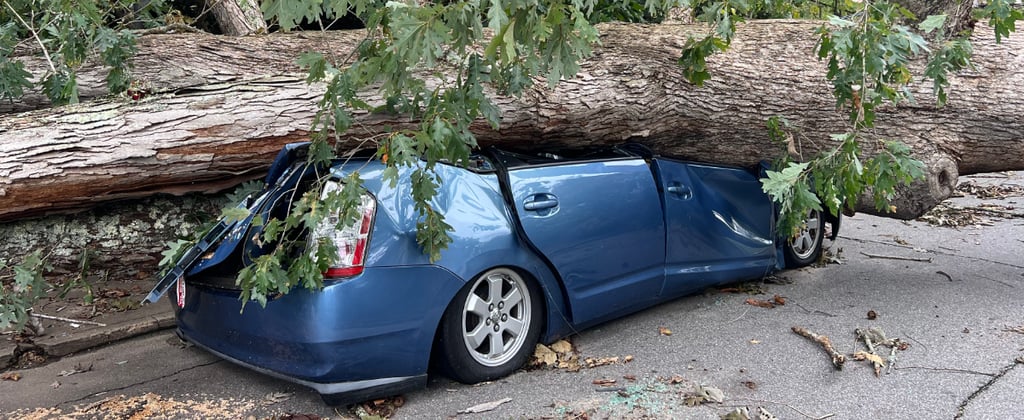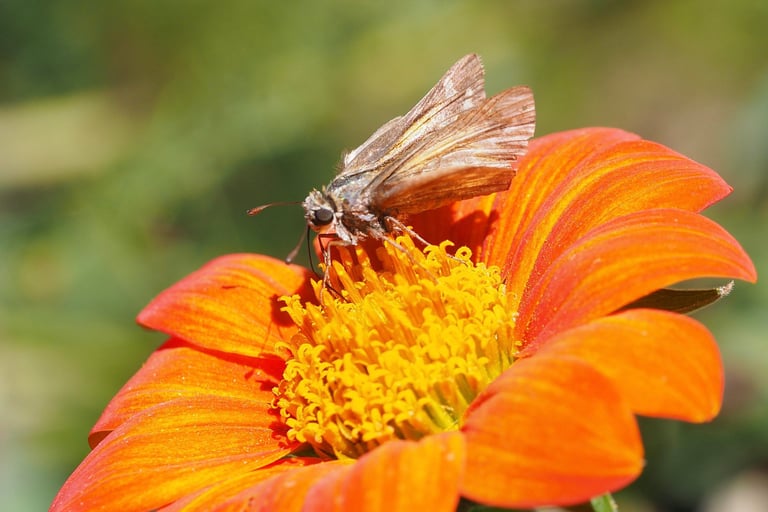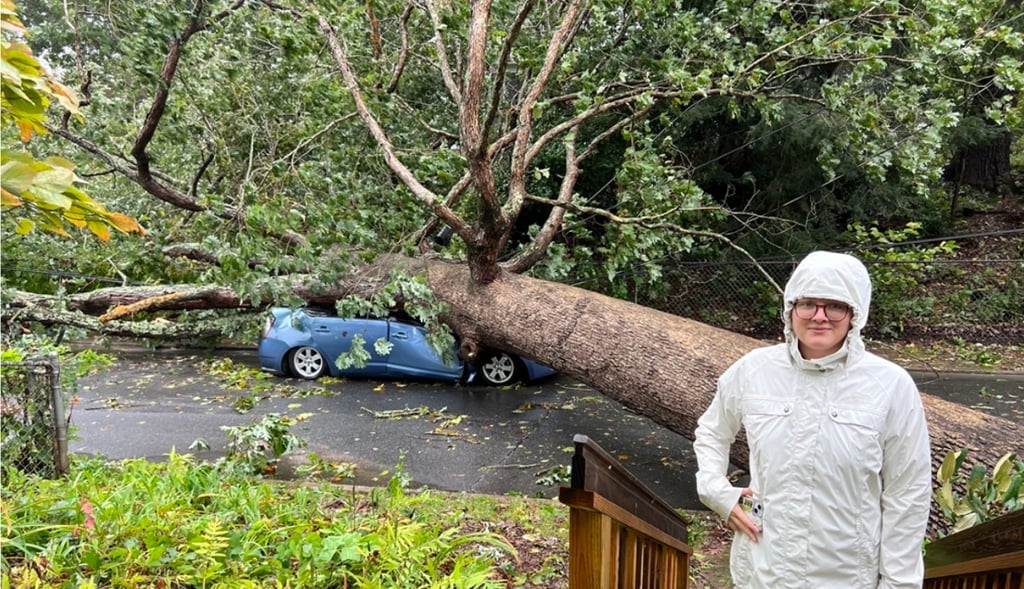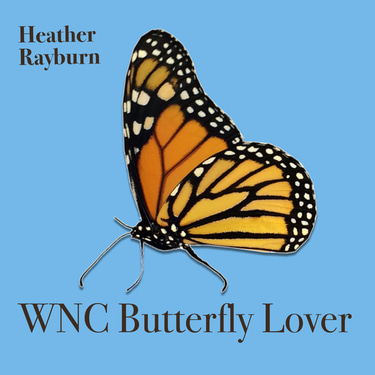Part 1: Asheville After the Hurricane
Hurricane Helene Knocks Us Sideways
Heather Rayburn
10/16/202410 min read


Butterfly Friends,
It’s a grim time and a strange time here in Western North Carolina after Hurricane Helene. So many have lost their lives, homes and livelihoods. We’ve suffered a horrible environmental catastrophe. We also continue to bear witness to the best of human nature, and we’re leaning on each other and help from around the country to persevere.
This is my story of the storm and its aftermath for us. For the first time in two weeks, I’ve been able to sit down, take a breath, and write about it. I lost a good chunk of my butterfly garden but I still have a nice untouched area full of blooming aster (with some mist plant and Mexican sunflower) that I surveyed last weekend. I’m happy to report the following:
10/12/24
Clouded Sulphur
Cabbage White
Red-banded Hairstreak
Gulf Fritillary
American Lady
Common Buckeye
Unidentified grass skipper (I think Sachem)
10/13/24
Clouded Sulphur
Cabbage White
Gulf Fritillary
American Lady
LONG-TAILED SKIPPER*
Fiery Skipper
Right now, I’m writing this from High Five Coffee on Broadway. There’s internet here and Jay, the owner and my good neighbor, is behind the counter smiling and welcoming people. It feels like a victory to be here, drinking a latte and using the internet. Jay and his wife Kim lost one of their coffee shops on the French Broad River. Over in east Asheville, my friend Christopher Fielden (click name for GoFundMe) lost his entire farm. The stories of people, animals, homes, businesses, and landscapes lost weighs so heavily.
Today, I feel like this old worn grass skipper that visited my yard on 10/12:


A shocking disaster
We just weren’t prepared for what happened. I’ve always felt so safe in these mountains. I finally visited our River Arts District next to the French Broad River, and it looks like it has been bombed. How could anyone caught in that survive? Asheville had the best water in the country. Hurricane Helene crushed our precious reservoir. Our rivers and creeks have filled with toxic debris. We’ve lost so many beautiful old trees, just everywhere you turn. I have moments of pure despair, and I haven’t been able to relax in any way, shape or form since this happened.
On Sept. 26, we received a text alert urging us to fill up containers with water, but we have gotten alerts before that have come to nothing. That night, I casually filled up a few pots and went to bed. I wasn’t at all worried. I didn’t hear the emergency alerts coming in during the night like my sister said she did because I don’t take my phone to bed. When I got up on Sept. 27, I went downstairs and saw the rain whipping the trees outside the window and then saw Ben and my niece Rayne sitting on the couch looking stunned.
“A tree came down and crushed Rayne’s car,” Ben said.
“Oh, no! One of ours?” We have two huge old-growth oaks that we love dearly.
“No, it wasn’t ours. It was Evan’s and Casey’s.”
The grand old oak from across the street had fallen. It pancaked Rayne’s car, our fence, and half my native plant garden, and nearly reached the porch. Weather nerd Ben had been on the porch drinking coffee and watching the storm when it happened. Across the street, Evan watched the scene as well and said that, afterward, several squirrels came up on his porch seeking shelter. On our porch screen, displaced moths gathered. The tree shook our house and woke Rayne up while I slept like a baby. Ben and Rayne heard other booms of trees and light poles falling.
We wouldn’t have power again for two weeks (Oct. 11). Cell service disappeared. It’s still not great. Water came back on last night (Oct. 15). It’s running brown with dirt as the city flushes the lines. I can’t even imagine how hard people had to work to get use power and water. We still don’t have internet.]
Despite no power on the morning of the storm, we still had water and could light our gas stove with a match. Ben and I took turns grinding coffee beans with a mortar and pestle. Not easy, but a great cup of coffee after our shock.
I texted my friend/tenant up the street and asked how she was doing. She sent a picture of a beautiful beach and said she was doing great and on vacation. I told her about the storm and said that I would go check on her truck when it felt safe.
After some time, the storm lifted and the sun came out. Our basement had about 14” of water in it. Ben had the presence of mind to fill two kitchen-sized trash cans with flood water, which we used for flushing for a few days. With no electricity, the sump pump didn’t work, so Ben used a hose and siphoned off a lot of the basement water, reducing it significantly.
After the storm, Ben and I walked up the street to check on the rental and saw a bunch of neighbors standing in front of it. Oh no! No! Another beautiful old oak down. It had landed directly on top of our rental. Thank goodness my tenant/friend Jill wasn’t in there!!! She would have survived, but the tree hit right over the bed, and it would have been very scary and traumatic. Ben ran back home for the key.
Opening the door, we found water all over the main bedroom floor and dining room and some in the bathroom and kitchen. The wall on one side of the house had separated from the structure. The ceilings in both bedrooms had cracked with the main bedroom drenched. Coal dust from back in the day had come out of the walls and coated the beautiful wood floors in black dust and piled up in the kitchen.
That basement had flooded as well, so Ben ran back home and got his portable sump pump. (Strangely enough, this house never lost power.) The pump worked for a while, but then it gunked up and stopped. In the meantime, me and Ben cleaned up the coal dust on the floors and started sopping up water.
I pulled all the soaked, tree-stained bedclothes off the bed and ran them back to our house and put them in the tub with some Oxyclean. Jill works so hard. I couldn’t stand the thought of her losing her stuff. My neighbor Stacey brought up her dog’s plastic swimming pool for us to put in the dining room to catch water from the leaking ceiling, and then she hauled the clothes that got damp to our porch and rigged up a clever drying rack.
Rayne brought plastic bags, and we started collecting dry clothes out of the wet dresser and moving them to the front of the house. Ben and I put down a piece of plastic in a dry area and managed to lift the soaked Temperpedic onto it. We tracked dirt on the welcome mat, and I took that back to the house and had finished cleaning it when the water cut out at our house. Duh! I could have been filling up things with more water instead of washing a welcome mat. Oh, well.
We still had no idea how badly the storm had hit Western North Carolina and how lucky we actually were compared to so many. That first and second day, we were in a communications blackout with no cell, wifi, or reliable news. Word began seeping through the neighborhood, though … Swannanoa, Marshall, Hot Springs, parts of Buncombe County – completely devastated. We heard that the highways around Asheville had been damaged and closed.
Night and day for the next week, we would hear non-stop sirens. I kept thinking, “What’s going on at the hospital?” (Mission Hospital, once an exceptional institution, has gone completely down the tubes after a purchase by a company called HCA. It’s disgraceful what this company has done to our hospital. How would they fare in a disaster? Turns out it was a horror scene up there.) In my neighborhood, we banded together to help each other, and it has stayed that way ever since. On one side of the street, neighbors had power and shared their refrigerators and set up porch charging stations right away.
It was clear that we all might be out of water for a good long while, and that thought scared me. Our good friend Michael Murphy fixed Ben’s sump pump and started clearing water from his and Susan’s basement into neighbors’ buckets for flush water. Some neighbors had rain barrels that provided gray water for flushing.
Someone said you could go to the nearby fire station and maybe get lucky and get some cell service to check on loved ones, but others said that too many were trying to use it there, and it wasn’t reliable.
Ben, Rayne and I drove a couple of miles to check in on Ben’s dad, Michael, who lives up a wooded, steep road. We made it halfway up the mountain, before we were blocked by a downed power pole and transformer. We had another quarter-mile to go and had to climb over and under giant trees. It felt like we were in a disaster movie. When we approached the house below my father-in-law’s house, we saw that part of the road had collapsed! At Michael’s driveway, the retaining wall had collapsed blocking his drive with trees down in front of his door. The house, thankfully, had made it. We knocked on the side door.
“Pack your bag! You’re coming with us.”
Once we had Michael, we all climbed back through the mud and rubble to the road where we ran into one of his neighbors maneuvering around a downed tree.
“Thank goodness you’re safe!” she said to Michael. We told her how we got up the mountain. “Climb in. It’s clear all the way down in this direction. I can take you back around and get to your car.”
“But our shoes are covered in mud.”
“No problem. Mud will wash out. I’m happy to do this for you.”
That’s how it’s been here in Asheville.
We checked in on our other tenants. Some tree damage, but nothing destroyed like the first one. At Ben’s mom’s house, a row of large pines that line her back drive and extend down the drive onto a shared easement had fallen like dominos. The last eight landed on the house. We checked on Ben’s mom at her assisted living. They had no electricity or water, but Mary Lou was happy as a clam, doing her sudokus with her cat in her lap.
Running on adrenaline
Whew. What a mess.
My main concern was water. The few pots I had wouldn’t last long. We have three grocery stores in our neighborhood: Harris Teeter, Trader Joe’s, and Whole Foods. Harris Teeter opened right away. They had power, and they did this community proud. (Soon they would be handing out free water and ice to anyone in need, but not yet.) I think it was the second day of the disaster, I went up there hoping to get some water. I stood in line for about 20 minutes. People were being so kind to each other.
Bottled water had ran out before I could get any. Fortunately, I did find a couple of cases of seltzer water, which made me feel much less anxious.
In the meantime, people were panicking about gas. Walking to the grocery store, I could see cars packed into the local gas station with a line of cars stretching the block. That’s one worry I didn’t have with my electric Bolt as I had a decent charge on it.
One day, very early on, a cheery group of UNCA students came walking through the neighborhood just after my friend Amy put out a box of free veggies from her church’s garden. The kids gathered around the box looking excited. They had a sense of adventure about them and were eager to talk.
“Hello,” I said, telling them some bit of helpful news. I can’t remember what it was now, possibly about how they could use basement water to flush.
“We don’t have a basement. We’re stuck in a dorm at UNCA,” said one of the students.
Another student said, “We have three port-a-potties for 400 students and the school has told us we need to leave. But we can’t leave because the roads are closed. So, we’ve just been eating junk food and walking around.”
These kids were like a roving band of sunshine, and we enjoyed getting to meet them. We invited them over to seen Rayne’s car, and then they continued on their way. Like us, they hadn’t been able to contact anyone via phone or web, but they were making the best of it getting out and meeting their neighbors.
How strange to live in the epicenter of a disaster and not know what’s happened and the extent of the emergency. However, a couple of days in, we learned that our local NPR station (88.1) had started broadcasting updates from city and county officials at 10 am and 4 pm. Rayne and I went across the street and listened to our first bit of real news at my friend Susan’s dining room table.
We learned that:
The water system had failed catastrophically;
Swannanoa had been absolutely devastated;
Multiple people had died in floods and landslides;
A shelter set up at the Ag Center had already filled;
A second shelter would open for medically-fragile people;
Portable cell towers would be set up asap and 20 truckloads of water were on the way;
Officials urged the public not to drive so the roads would be free for first responders;
Our awesome register of deeds office (led by Drew Reisinger) had set up a website/phone number for missing persons reports and had started organizing community volunteers;
A couple of places downtown had internet available to the public. (I tried one of them and couldn't get it to work).
Lots of people were still going to the fire station for cell service, but Ben found out from someone that he could send and receive texts in front of the Chamber of Commerce. So I went up there and started texting my peeps to see if they were okay. I had a few people on my mind, especially my friends Beth and Christopher who live near the Swannanoa River. Also, my friends Pete, Mary, and Dana in Hot Springs and my friend Gail in Weaverville. How did my sister and brother-in-law and other friends make it?
Thanks to that cell connection that Ben found, I would soon know.
TO BE CONTINUED ...
*As per the style of reporting butterfly sightings to the CarolinaLeps Listserve, I list rarely-seen species in all caps. The Long-tailed Skipper mainly breeds in Florida and takes its time travelling to the Carolinas. In 2023, I only recorded one on 9/25 & 9/26 in the yard. In 2024, I’ve only recorded a Long-tailed Skipper in the yard on 9/24/24 previous to this one.


© 2025 Heather Rayburn all text and images
